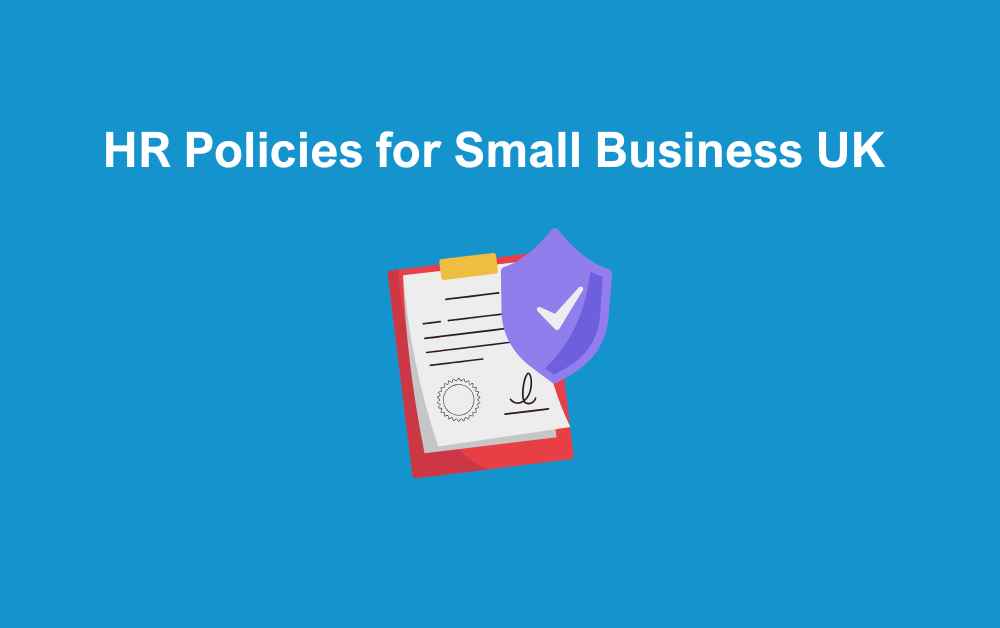HR policies for small business UK are a vital part of creating a fair, compliant, and productive workplace. For small business owners, having clear and consistent HR policies in place not only helps meet legal obligations but also supports employee engagement and smooth day-to-day operations. In this blog post, we’ll explore the essential HR policies every small business in the UK should have, explain their importance, and offer practical tips on how to develop and implement them effectively. Whether you’re starting from scratch or reviewing existing policies, this guide is here to help.
Jump to a Section:
Why HR Policies for Small Business are Essential
HR policies set out the standards of behaviour, performance, and conduct expected within your business. They give employees a better understanding of what is required of them, how certain situations will be handled, and what support is available. This not only reduces confusion but also helps to create a fair and transparent workplace culture.
From a legal standpoint, well-drafted policies help ensure compliance with UK employment law and demonstrate that your business is acting responsibly. In the event of a dispute or grievance, having written procedures in place can be vital for protecting your business.
They also play a key role in onboarding and training, offering a reference point for new starters and a framework for managers to make consistent decisions. Ultimately, HR policies are not just a tick-box exercise – they are a practical tool to help your business run smoothly, build trust within your team, and support future growth.
Top Policies to Introduce in your Small Business
There are a range of HR policies for small business UK that are required by law. This includes:
Disciplinary and dismissal policy
The Employment Rights Act 1996 states that employers should provide their staff with a note on the procedure that applies to disciplinary decisions. This document should clearly outline the process for managing performance issues and misconduct. A disciplinary policy helps to ensure proceedings are fair, compliant, and consistent. The main purpose being to protect both employees and employers.
Grievance policy
A comprehensive grievance policy provides a clear process for employees to raise concerns, ensuring issues are handled promptly and fairly. It should also outline steps for addressing serious matters, including links to dismissal procedures where appropriate. This is one of the most important HR policies for small business UK.
Health & safety policy
A health and safety policy helps protect employees from workplace hazards and ensures legal compliance, covering risk assessments, emergency procedures, and training. You can also include information on your employee assistance programme, if available, to support mental health and wellbeing.
Other policies that are recommended include:
Equality and diversity policy
This policy promotes a workplace culture that values diversity and ensures fair treatment for all employees, helping to prevent discrimination and meet legal requirements under the Equality Act 2010.
Annual leave policy
Clearly outlining how holiday entitlement is calculated, requested, and approved helps ensure transparency and consistency, while supporting staff wellbeing through regular rest periods.
Data protection and privacy policy
A data protection policy sets out how employee and customer data is collected, stored, and used in line with the UK GDPR, protecting sensitive information and maintaining trust.
Sickness, leave and absence policy
Other HR policies for small business UK included sickness, leave and absence. This policy explains the procedure for reporting absence, eligibility for sick pay, and any required documentation. It helps to manage absences effectively and support employee health.
Flexible working policy
A flexible working policy outlines the process for requesting changes to working hours or patterns. It supports work-life balance and demonstrates a commitment to modern, inclusive practices.
Family leave policy
Covering maternity, paternity, adoption, and shared parental leave, this policy helps employees understand their rights and entitlements while planning for family changes.
Drugs and alcohol policy
This policy outlines expectations regarding substance use and the procedure for dealing with any related concerns. It promotes a safe and productive workplace.
Social media policy
Setting clear guidelines for professional and personal use of social media helps protect your business’s reputation. It also defines acceptable online behaviour for employees.
Neonatal care leave policy
In line with the recent changes from the Neonatal Care (Leave and Pay) Act, this outlines entitlements for parents of babies requiring specialist care after birth.
Implementing Policies for Small Business UK
Here’s an overview on implementing HR policies in your business:
- Make sure the policy is necessary for your business. If it’s not expected by law, it’s not relevant to your business, or you’ve already covered it in another fully up to date policy, consider if this is necessary.
- Ensure the document has all the correct information that will be understood by employees
- Managers must also understand and implement the contents
- Regularly review and update when necessary. This ensures you are more prepared if any issues arise in the future and set you up for better success as an employer and business.
It’s important to keep in mind that once a policy is written, it shouldn’t just live in a filing cabinet gathering dust. You must discuss this with your team and ensure they have read the document and know what is required of them. Policies such as grievance and disciplinary must be in the form of a written statement of terms and conditions that staff can easily read and understand. In addition, It may be a good idea for you to approach a professional to help you with this.
What Would Happen if Policies Aren’t in Place?
Not having up to date hr policies for small business UK can have a negative impact on the success of your business. Not only does it send a message to your employees that their rights and wellbeing is not important to you, it also gives the impression that you don’t stand for anything meaningful as a business. Employees and candidates want to be part of a business that has an ethos that aligns with their morals and beliefs. In addition, not having certain policies can lead you to losing a lot of staff and struggling to attract candidates.
You will also be less prepared and covered if an employment tribunal or work related issue arises in the future.
Contact Us
If you would like support to write or review HR Policies, feel free to contact us on 01383 668 178 or info@thehrbooth.co.uk. We have written HR policies for Small business UK, and larger companies. Therefore, you can feel confident that our HR experts will ensure you are fully compliant. We have also created an Employment Law checklist guide that you can download here.







